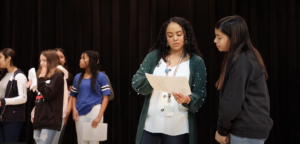
Theatre in Texas Schools
Theatre education in Texas is available to students at the elementary, middle, and high school levels. It is required at the elementary level, and as a choice, for students to complete their fine arts requirements at the middle and high school levels. Depending on the size of the district, a dedicated elementary theatre teacher may be assigned to one campus. In middle school, students delve more deeply into the medium of theatre. Productions and after-school activities such as Junior Thespians may be offered. In high school, students may elect to take performance-based classes or technical theatre classes. Depending on the size of the district, these may be taught by the same person or multiple teachers. At the high school level, multiple full-scale productions are typically offered per year providing students opportunities to explore a variety of theatrical genres and styles.
What a Theatre Teacher Does
Theatre Teachers help students exercise and develop creativity, intellectual curiosity, critical thinking, problem-solving, and collaboration skills. Theatre Teachers provide experiences for students to explore concepts about self, human relationships, and society using elements of drama and conventions of theatre. Theatre Teachers introduce students to design, directing, and all aspects and concepts of a theatrical production. Theatre Teachers carefully plan and organize lessons that relate theatre to history, society, culture, and heritage. Most important of all, a passionate Theatre Teacher provides a safe and inclusive learning environment that allows students to participate in, respond to, and evaluate theatre performances in class and on the stage.
The Impact a Theatre Teacher Makes
Theatre teachers have a unique impact on the classroom that will resonate with students for the rest of their lives. Along with reinforcing core content, Theatre Teachers impact students by developing social and emotional learning. Self-confidence, spatial awareness, public speaking, and empathy are no longer considered soft skills. Teaching theatre provides a safe and inclusive environment in which these skills may be fostered. This provides students with the opportunity to be well-rounded, culturally and socially responsible, and sensitive to others, while developing a greater sense of who they are in relation to the world in which they live. The theatre classroom and after-school activities are opportunities for students to make lifelong discoveries about themselves and others. It provides students with a creative outlet for learning to engage professionally and respectfully with others, a skill that will lead to success in transitioning to college, career, and adulthood.
Why I should consider becoming a Theatre teacher?
Becoming a theatre teacher provides you with an opportunity to immerse yourself in theatre every day. Unlike a typical performance or design career, where there may be large gaps between shows, theatre teachers create their own schedule of shows and are continually working on the next project. Teaching theatre also allows you to explore and practice many aspects of theatre. From producing, to directing, to creating sets, and designing lights, becoming a theatre teacher allows you to grow and build capacity as an artist in many areas. In addition, there are many opportunities to network, connect, and collaborate with other theatre teachers and through contests, workshops, conferences, and professional organizations. Although most public school theatre teachers are paid year-round, the majority of theatre teachers are not contracted to teach in the summer. This provides them with an opportunity to rejuvenate, spend time with family and friends, or continue to pursue individual artistic and educational endeavors.